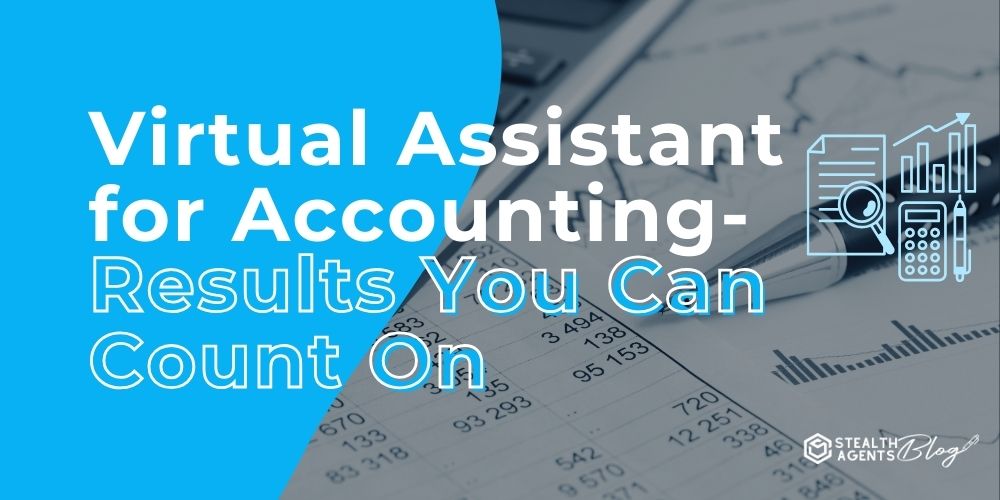Managing business finances is exhausting when you try to do it all alone. You spend hours on data entry and receipts instead of focusing on growing your company. Statistics show that businesses often save up to 60% on operational costs by outsourcing administrative duties to skilled professionals.
This blog explains how an accounting virtual assistant can handle your bookkeeping and give you your time back. We will cover the specific tasks they manage, the benefits for your bottom line, the virtual assistant for accounting price rate, and how to start hiring safely.
You deserve a financial solution that removes the stress of daily money management.
Why Accounting Tasks Are Overwhelming Business Owners
Every business owner knows the sinking feeling of seeing a stack of unsorted invoices on their desk. You start your day hoping to close new deals or improve your product, but you end up trapped in spreadsheets. Accuracy requires focus, but you are pulled in a dozen directions at once. When you try to squeeze bookkeeping into the margins of your day, mistakes happen.
These small errors compound quickly. A missed invoice means delayed cash flow. A data entry error messes up your reconciliation. Suddenly, you are spending your weekends trying to fix problems that shouldn’t have happened in the first place. This cycle steals time from the high-value work that actually builds your business.
Most founders treat accounting as a chore they can handle “later.” But “later” often turns into tax season panic. When numbers fall behind, the health of the entire business suffers. You lose visibility into your profit margins and cash position. The stress of financial uncertainty weighs on you constantly, affecting your decision-making and your peace of mind.
What a Virtual Assistant Accounting Can Do?
There is often confusion about the difference between a certified accountant and a virtual assistant. Think of your CPA as the architect of your financial strategy, while an accounting virtual assistant is the builder who keeps the site clean and moving every day. Your CPA handles high-level tax strategy, audits, and compliance. Your virtual assistant handles the daily grind that keeps your CPA happy.
Hiring a virtual assistant for accounting does not mean you are firing your accountant. It means you are giving your accountant better data to work with. You delegate the repetitive, time-consuming tasks that do not require a CPA license but still demand attention to detail. This partnership allows your expensive professionals to focus on high-value consulting rather than fixing data entry typos.
Safe delegation starts with understanding the boundaries. You likely wouldn’t ask a VA to represent you in a tax audit. However, you absolutely should ask them to organize the receipts for that audit. By using consistent processes, a virtual assistant ensures your books stay current every week.
Many finance and accounting outsourcing companies recommend this tiered approach to staffing. It ensures you aren’t paying premium rates for basic administrative work, while still maintaining high standards for your financial records.
Stealth Agents Accounting Virtual Assistant Services
Stealth Agents provides dedicated virtual assistants trained to handle accounting-related tasks securely and accurately. We understand that trusting someone with your financial data is a big step. That is why our team focuses on precision and reliability above all else. Here is a breakdown of the specific tasks our assistants manage for you:
1. Bookkeeping Data Entry
Your assistant enters daily transactions into your accounting software. They ensure every expense is recorded, every income source is logged, and the data is clean. This prevents the backlog that usually ruins your month-end closing process.
2. Invoice Creation and Follow-ups
Cash flow is the lifeblood of your business. Your VA can generate invoices immediately after you complete a job. More importantly, they handle the awkward follow-up emails for unpaid bills. This ensures you get paid faster without having to chase clients personally.
3. Accounts Payable & Receivable Tracking
Knowing who you owe and who owes you is critical. Your assistant maintains accurate lists of all payables and receivables. They can prepare payment schedules for your approval, ensuring you never miss a vendor payment deadline again.
4. Expense Categorization
A coffee with a client is different from office supplies. Your VA sorts every transaction into the correct category. This granularity gives you a clear picture of where your money is going and makes tax time significantly easier.
5. Bank and Credit Card Reconciliation Support
Discrepancies between your bank statement and your accounting software need to be found fast. Your assistant matches transactions weekly or monthly. They flag any oddities for your review so you can address potential fraud or errors immediately.
6. Payroll Data Preparation
While they may not process the final payroll transfer, your VA prepares the hours, commissions, and bonuses. They ensure the data sent to your payroll provider is accurate, preventing upset employees and payroll correction fees.
7. Financial Document Organization
Receipts, contracts, and tax notices need a home. Your assistant organizes your digital filing system. When you need a specific document from three years ago, they can find it in seconds.
8. Reporting Assistance
Need to know your monthly burn rate? Your VA can pull standard reports from your software. They provide you with the raw data summaries you need to make informed decisions without you having to navigate complex dashboards.
In addition to these core tasks, we also offer an accounting firm virtual receptionist service. This ensures that while your back office is being organized, your front-facing client communication remains professional and responsive.
How an Accounting Virtual Assistant Saves Time and Money
The return on investment when hiring a virtual assistant is often immediate. Consider your hourly rate as a business owner. If you spend five hours a week on bookkeeping, that is five hours you aren’t selling or leading. An accounting virtual assistant costs a fraction of your effective hourly rate.
Faster processing of daily transactions means you have real-time data. You don’t have to guess if you can afford that new equipment; you can look at the up-to-date reports your VA prepared. This speed translates to better agility in the market.
Reduced errors also save you money. A simple data entry mistake can result in overpaying a vendor or under-charging a client. Consistency prevents these leaks. When your processes are followed the same way every time, the error rate drops dramatically.
Improved cash flow is perhaps the most tangible benefit. When invoices go out on time and overdue payments are chased consistently, money lands in your bank account sooner. This liquidity solves many other business headaches.
Finally, you save on the cost of employment. Comparing the cost of a virtual assistant to an in-house staff member reveals massive savings. You don’t pay for benefits, office space, or equipment. You get the support you need without the overhead that drags down your profitability.
Why Stealth Agents Is Safer Than Freelancers or DIY Outsourcing
You might be tempted to hire a random freelancer from a job board. This is a risk when dealing with financial data. Stealth Agents offers a layer of security and management that freelancers cannot match.
Our assistants are pre-vetted and trained in confidentiality. We understand that financial privacy is non-negotiable. Our rigorous selection process ensures only trustworthy individuals handle your accounts. You aren’t just hiring a person; you are hiring a secure system.
With a freelancer, if they get sick or quit, your bookkeeping stops. With Stealth Agents, you have a partner. We provide account management and performance oversight. If issues arise, you have a manager to speak with, not just a missing freelancer.
We also enforce secure processes and documentation standards. We help you set up safe ways to share access without handing over the keys to the kingdom. This structure protects you and ensures continuity.
Stealth Agents is more than just accounting support. As your business needs evolve, we can help in other areas. We can even provide a franchise management virtual assistant if you are scaling multiple locations. Our services expand to:
- Administrative assistance: Scheduling, email, and travel.
- Executive reporting support: Preparing slide decks and meeting briefs.
- CRM and data management: Keeping your customer lists clean.
- Operations and back-office support: Handling the logistics of your business.
Trust and consistency matter when finances are involved. Do not gamble your books on an unverified stranger.
Who Should Hire an Accounting Virtual Assistant Now
Stealth Agents is the ideal partner for specific types of business owners. If you run a small or medium-sized business, you likely don’t need a full-time CFO, but you definitely need help. We bridge that gap.
Founders who are handling books after hours are our prime clients. If you are doing reconciliation at 10 PM on a Friday, you need to hire us. You are burning out, and your business is not getting your best energy.
Agencies managing multiple client invoices also benefit. If you have complex billing needs, a VA can manage the tracking so you don’t lose revenue. Growing companies preparing for audits or tax filings use us to get their house in order before the regulators look.
Common Triggers for Hiring:
- Falling behind on bookkeeping: You have months of unrecorded transactions.
- Cash flow confusion: You don’t know how much money you actually have.
- Upcoming tax deadlines: The filing date is looming and your records are a mess.
- Rapid business growth: You are selling so much that the paperwork is burying you.
If you recognize these signs, it is time to act. Waiting only makes the pile higher and the cleanup harder.
The Cost of Delaying Accounting Support
Ignoring your accounting problems does not make them go away. Financial inaccuracies compound over time. A small error in January becomes a massive headache by December. The effort required to fix twelve months of bad data is expensive and painful.
Late invoices delay cash flow, which can stall your operations. You might struggle to pay your own team because you haven’t collected what is owed to you. This is a preventable crisis.
Stress during audits and tax season is a heavy burden. The fear of penalties or compliance issues can distract you from running your company. An accounting virtual assistant costs far less than the financial mistakes that happen when you are rushing. The peace of mind of knowing your books are clean is worth the investment alone.
Start Hiring an Accounting Virtual Assistant With Stealth Agents
You do not have to struggle with spreadsheets any longer. Stealth Agents is ready to provide you with a dedicated accounting virtual assistant who can organize your finances and protect your time.
We offer fast onboarding and clear standard operating procedures (SOPs). We don’t just dump a worker on you; we help you integrate them into your workflow. Our support is scalable, meaning we grow as you grow. You get reliable communication and accountability every step of the way.
Call to Action:
Hire an accounting virtual assistant today. Get your books back under control and stop worrying about the numbers. Let Stealth Agents handle the details while you focus on the growth of your business.
Stop Overpaying: Discover Your Accounting Virtual Assistant Rate
Hiring help for your finances is one of the smartest investments you can make for your peace of mind. You get accurate books, on-time invoices, and the freedom to lead your company. Check our competitive accounting virtual assistant rate and start your journey toward financial clarity today.
Frequently Asked Questions
How much does it cost to hire a virtual assistant for accounting services?
Virtual assistants for accounting usually cost $15-25 per hour, depending on their experience and skills. This cost is often worth it because it saves money on operations and improves how tasks are handled. Some agencies offer free consultations to help you find the right pricing for your needs.
What accounting software certifications should a virtual assistant have?
Good virtual assistants for accounting should be certified in tools like QuickBooks Pro, Xero, FreshBooks, and Excel. Some also have bookkeeping certificates or CPA-related training. Certifications in other tools like Sage or Wave can be helpful, especially for specific industries.
Can virtual accounting assistants work across different time zones?
Yes, virtual assistants for accounting can adjust their schedules to match your business hours. Whether you need help during the day, evening, or specific regional times, many VAs are flexible and can work when you need them.
What security measures protect my financial data with virtual accounting assistants?
Professional services use strong security measures like encrypted communication, secure cloud storage, and confidentiality agreements. They also monitor activities and train VAs on how to handle sensitive data safely. Background checks are often done to ensure trustworthiness.
How long does it take to train a virtual assistant for my specific accounting needs?
Training usually takes 1-2 weeks, depending on how complex your systems are. Experienced VAs may need less time because they are already familiar with many tools and processes. Training often includes learning your systems, reviewing workflows, and practice tasks.
What happens if my virtual accounting assistant becomes unavailable or leaves?
If your VA becomes unavailable, many agencies offer free replacements. They keep records of your processes and have backup VAs ready to step in. This ensures your accounting tasks continue without interruptions.
Do virtual assistants for accounting provide monthly financial analysis and insights?
Yes, experienced VAs can create financial reports, analyze trends, and highlight important numbers. They can prepare summaries that help you understand your business’s financial health and make better decisions.
Can virtual accounting assistants help with audit preparation and compliance?
Yes, VAs can help organize documents, create audit trails, and ensure compliance records are ready. They can also prepare schedules and files for auditors. While they don’t replace CPAs, they handle the prep work, making audits faster and easier.
What communication methods work best with virtual accounting assistants?
You can communicate with VAs through video calls, instant messaging, project management tools, and email. Regular check-ins, clear instructions, and scheduled updates help keep everything on track.
Are virtual assistants for accounting suitable for seasonal businesses with fluctuating needs?
Yes, virtual assistants are great for seasonal businesses because you can adjust their hours based on your needs. During busy times, you can increase their workload, and during slow periods, you can reduce it. This flexibility helps you save money while still getting the support you need.









